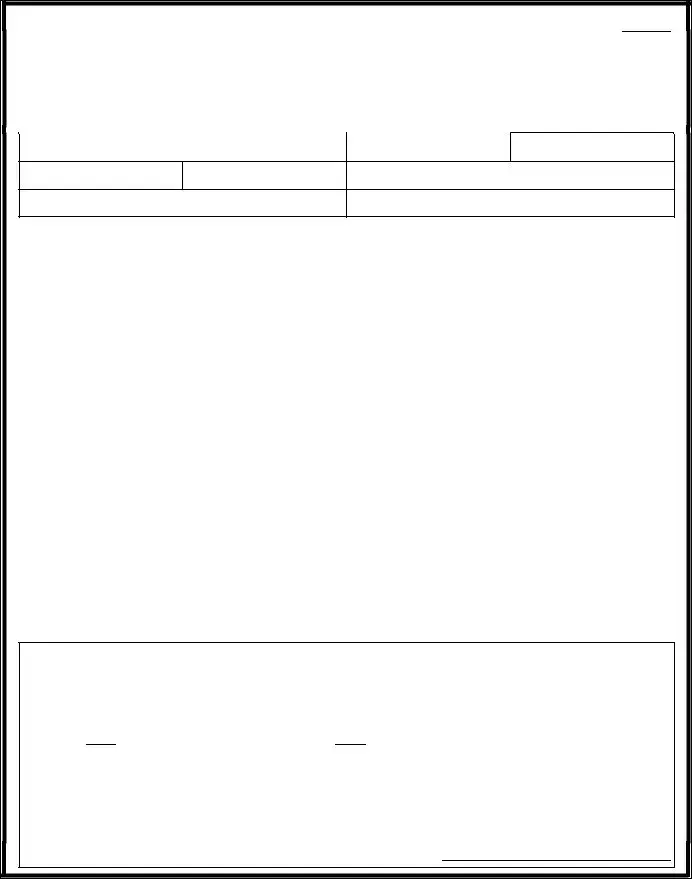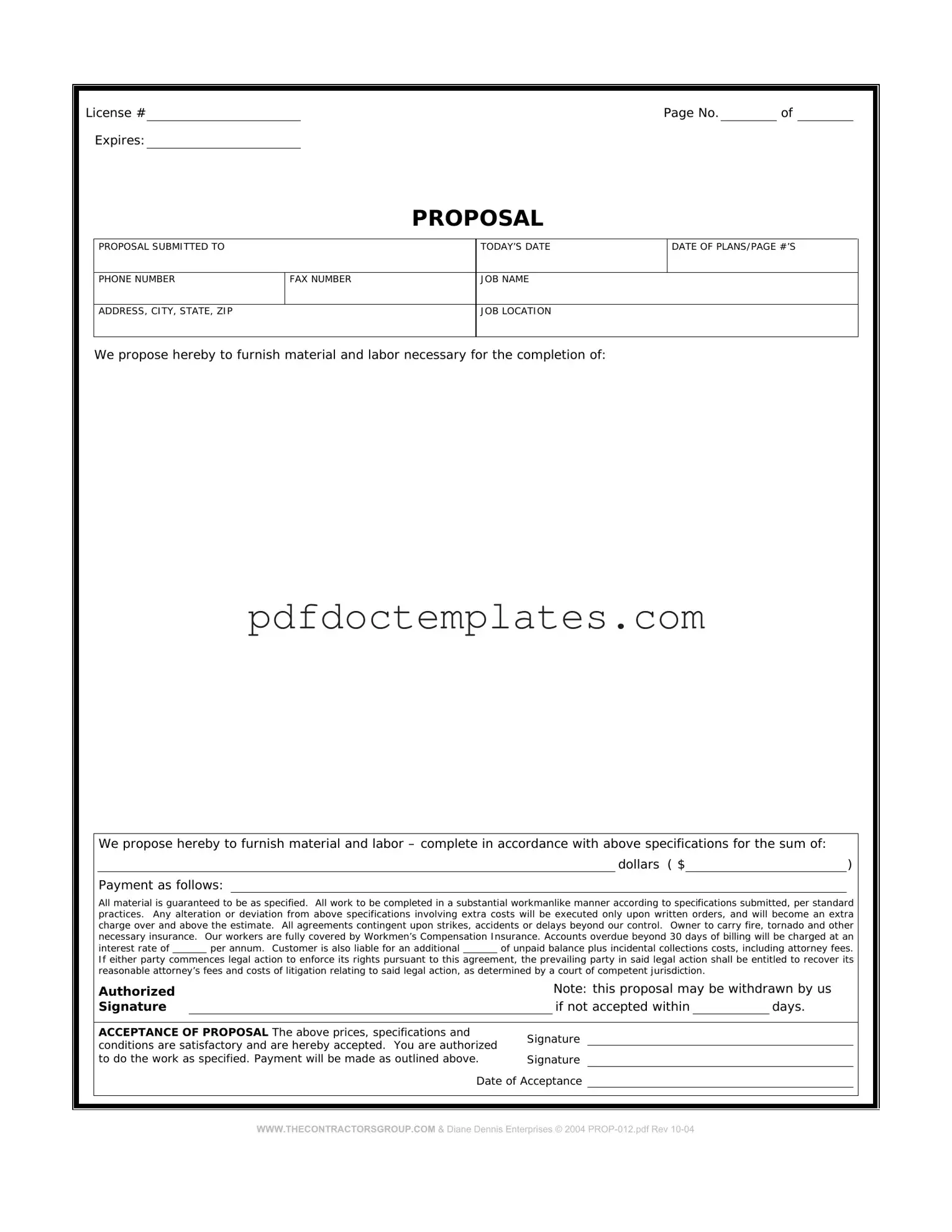Download Construction proposal form Template
Misconceptions
There are several misconceptions about the Construction Proposal Form that can lead to confusion. Here are six common misunderstandings:
-
It is only for large projects.
Many people believe that a construction proposal form is only necessary for big projects. However, this form can be used for projects of any size, from small renovations to large constructions.
-
It guarantees project approval.
Some think that submitting a proposal means their project will automatically be approved. In reality, the form is just a step in the process, and approval depends on various factors.
-
Only contractors need to fill it out.
While contractors often complete the form, homeowners and project managers may also need to provide information or sign it, depending on the situation.
-
It is a one-time document.
Many assume that once the proposal is submitted, it is finished. However, changes to the project may require updates to the proposal, making it an ongoing document.
-
All forms are the same.
Some people think that all construction proposal forms are identical. In fact, different projects and jurisdictions may have specific requirements, leading to variations in the forms.
-
It only includes cost estimates.
While cost estimates are a key part of the proposal, the form also includes details about timelines, materials, and project scope, making it more comprehensive than just a budget.
File Details
| Fact Name | Description |
|---|---|
| Purpose | The construction proposal form outlines the terms and conditions for a construction project, including scope, costs, and timelines. |
| Parties Involved | The form typically includes information about the contractor, subcontractors, and the project owner. |
| Governing Law | In California, the governing law for construction contracts is found in the California Civil Code. |
| Cost Estimates | Detailed cost estimates must be included to provide transparency and clarity on project expenses. |
| Timeline | A proposed timeline for project completion is essential for managing expectations and scheduling. |
| Change Orders | The form should address how changes to the original proposal will be handled, including costs and time adjustments. |
| Signatures | All parties must sign the form to indicate agreement and understanding of the proposal's terms. |
| State-Specific Forms | Each state may have specific requirements for construction proposal forms, such as additional disclosures or licensing information. |
Key takeaways
When it comes to filling out and using a construction proposal form, understanding the essentials can make a significant difference in the outcome of your project. Here are four key takeaways to keep in mind:
- Clarity is Crucial: Ensure that all details, such as project scope, timelines, and costs, are clearly outlined. Ambiguities can lead to misunderstandings and disputes later on.
- Accurate Estimates Matter: Providing realistic cost estimates is vital. Overestimating or underestimating can affect your credibility and the feasibility of the project.
- Include All Necessary Information: A comprehensive proposal should include not just the costs, but also the materials to be used, labor requirements, and any necessary permits. This completeness helps in building trust with clients.
- Review and Revise: Before submitting your proposal, take the time to review it thoroughly. A well-prepared document reflects professionalism and attention to detail.
Dos and Don'ts
When filling out a construction proposal form, it’s important to approach the task with care and attention to detail. Here are five things you should and shouldn’t do:
- Do read the entire form carefully before starting. Understanding what is required will help you provide accurate information.
- Do provide clear and concise information. Use straightforward language to ensure your proposal is easily understood.
- Do double-check your calculations. Accuracy in numbers is crucial, as errors can lead to misunderstandings or financial discrepancies.
- Do include all required documents. Supporting materials can strengthen your proposal and provide necessary context.
- Do keep a copy of the completed form for your records. This can be helpful for future reference or follow-up.
- Don’t rush through the form. Taking your time can prevent mistakes and ensure completeness.
- Don’t leave any sections blank unless instructed. Omitting information can lead to delays or rejection of your proposal.
- Don’t use jargon or overly technical language. Aim for clarity to avoid confusion for the reviewer.
- Don’t forget to proofread your submission. Spelling or grammatical errors can detract from your professionalism.
- Don’t submit your proposal without a final review. A fresh set of eyes can catch errors you might have missed.
Common mistakes
When filling out a construction proposal form, individuals often overlook important details. Here are six common mistakes that can lead to complications:
-
Incomplete Information: Many people forget to fill in all required fields. This can include missing contact information or project details, which may delay the approval process.
-
Incorrect Pricing: Errors in estimating costs are frequent. Some may underestimate materials or labor, leading to budget issues later on.
-
Not Reading Instructions: Skipping the instructions can result in misunderstandings. Each section may have specific requirements that need attention.
-
Omitting Deadlines: Failing to specify project timelines can create confusion. Clear deadlines help manage expectations for all parties involved.
-
Neglecting Signatures: Some forget to sign the proposal. Without a signature, the document may not be considered valid.
-
Ignoring Legal Requirements: Overlooking local regulations or licensing requirements can lead to compliance issues. It's crucial to be aware of these before submission.
By avoiding these mistakes, individuals can ensure a smoother process when submitting their construction proposals.
What You Should Know About This Form
-
What is a construction proposal form?
A construction proposal form is a document used by contractors to outline the details of a construction project. This form typically includes information about the scope of work, materials needed, timelines, and estimated costs. It serves as a formal offer to perform the work specified and is often required for bidding on projects.
-
Why is it important to use a construction proposal form?
Using a construction proposal form is crucial for several reasons. First, it provides clarity and transparency regarding the project's scope and costs. Second, it helps protect both the contractor and the client by setting clear expectations. Lastly, it can serve as a legal document in case of disputes, ensuring both parties have a reference point for agreed-upon terms.
-
What information should be included in a construction proposal form?
A comprehensive construction proposal form should include:
- The contractor's contact information
- The client's contact information
- A detailed description of the project
- Materials and labor costs
- Project timeline and milestones
- Payment terms
- Any necessary permits or licenses
-
How can I ensure my construction proposal is competitive?
To create a competitive construction proposal, conduct thorough research on market rates for materials and labor. Provide a detailed breakdown of costs and consider offering various options for different budget levels. Highlight your experience and qualifications, and ensure that your proposal is clear and professionally presented.
-
Is it necessary to have a lawyer review my construction proposal form?
While it is not strictly necessary, having a lawyer review your construction proposal form can be beneficial. A legal expert can help identify any potential issues or ambiguities that could lead to disputes later. They can also ensure that your proposal complies with local laws and regulations, providing an extra layer of protection.
-
Can a construction proposal be modified after submission?
Yes, a construction proposal can be modified after submission, but both parties must agree to the changes. It is essential to document any modifications in writing to maintain a clear record of the agreed-upon terms. This helps avoid misunderstandings and ensures that all parties are on the same page.
-
What happens if my proposal is accepted?
If your proposal is accepted, you will typically enter into a contract with the client. This contract will outline the terms of the project, including the scope of work, payment schedule, and timeline. It is crucial to review the contract carefully to ensure that it reflects the terms of your proposal accurately.
-
What should I do if my proposal is rejected?
If your proposal is rejected, don't be discouraged. Seek feedback from the client to understand their reasons for the decision. This feedback can be invaluable for improving future proposals. Additionally, consider adjusting your proposal based on the client's needs or budget and resubmitting it if appropriate.
-
Are there any specific regulations I need to be aware of when creating a construction proposal?
Yes, there may be specific regulations that vary by state or locality. These regulations can include licensing requirements, safety standards, and zoning laws. Familiarizing yourself with these rules is essential to ensure compliance and avoid potential legal issues. Consulting with local authorities or a legal expert can provide guidance tailored to your specific situation.
Construction proposal form Example

License # |
|
Page No. |
|
of |
Expires: |
|
|
|
|
PROPOSAL
PROPOSAL SUBMITTED TO |
TODAY’S DATE |
DATE OF PLANS/PAGE #’S
PHONE NUMBER
FAX NUMBER
JOB NAME
ADDRESS, CITY, STATE, ZIP
JOB LOCATION
We propose hereby to furnish material and labor necessary for the completion of:
We propose hereby to furnish material and labor – complete in accordance with above specifications for the sum of: |
|
|||
|
|
dollars ( $ |
|
) |
Payment as follows: |
|
|
||
All material is guaranteed to be as specified. All work to be completed in a substantial workmanlike manner according to specifications submitted, per standard practices. Any alteration or deviation from above specifications involving extra costs will be executed only upon written orders, and will become an extra charge over and above the estimate. All agreements contingent upon strikes, accidents or delays beyond our control. Owner to carry fire, tornado and other necessary insurance. Our workers are fully covered by Workmen’s Compensation Insurance. Accounts overdue beyond 30 days of billing will be charged at an
interest rate of per annum. Customer is also liable for an additional of unpaid balance plus incidental collections costs, including attorney fees. If either party commences legal action to enforce its rights pursuant to this agreement, the prevailing party in said legal action shall be entitled to recover its reasonable attorney’s fees and costs of litigation relating to said legal action, as determined by a court of competent jurisdiction.
Authorized |
|
Note: this proposal may be withdrawn by us |
|||||
Signature |
|
|
if not accepted within |
|
days. |
||
|
|
|
|
|
|
|
|
ACCEPTANCE OF PROPOSAL The above prices, specifications and |
Signature |
|
|
|
|||
conditions are satisfactory and are hereby accepted. You are authorized |
|
|
|
||||
|
|
|
|
|
|
||
to do the work as specified. Payment will be made as outlined above. |
Signature |
|
|
|
|
||
Date of Acceptance
WWW.THECONTRACTORSGROUP.COM & Diane Dennis Enterprises © 2004
Consider More Forms
Quick Invoice Maker - Make a powerful impression with a sleek, modern invoice design.
Texas Temporary Tag - Ensuring compliance with the Texas Temporary Tag form is beneficial for all drivers.
The California Last Will and Testament form is a vital legal document that allows individuals to specify how they wish their assets to be distributed upon their death. It serves as a critical tool in estate planning, ensuring that a person's final wishes are respected and legally upheld. For those looking to create or update their will, utilizing an online resource such as the Last Will and Testament form can streamline the process, providing clarity and peace of mind for both the individual and their beneficiaries.
Simple Boyfriend Application Form - A sports lover, regularly following and participating in local teams.
